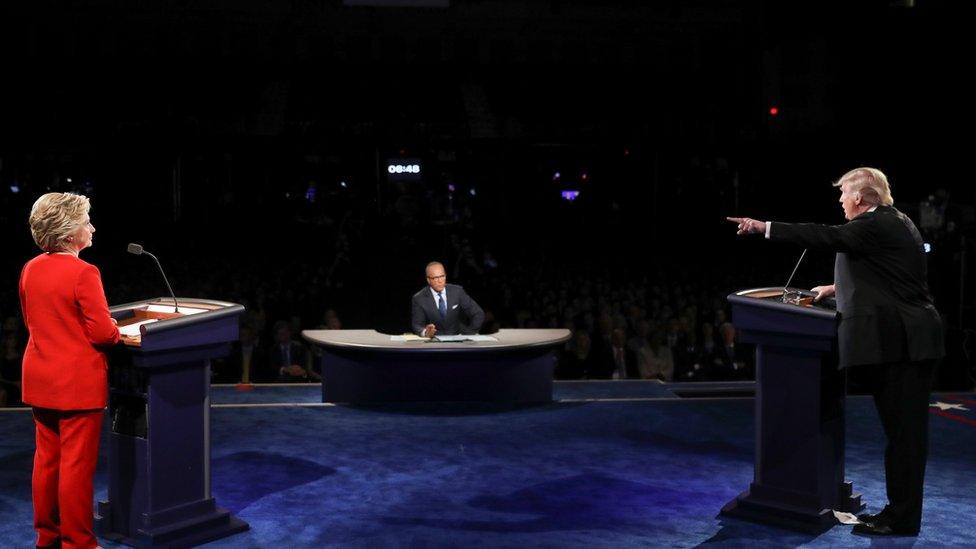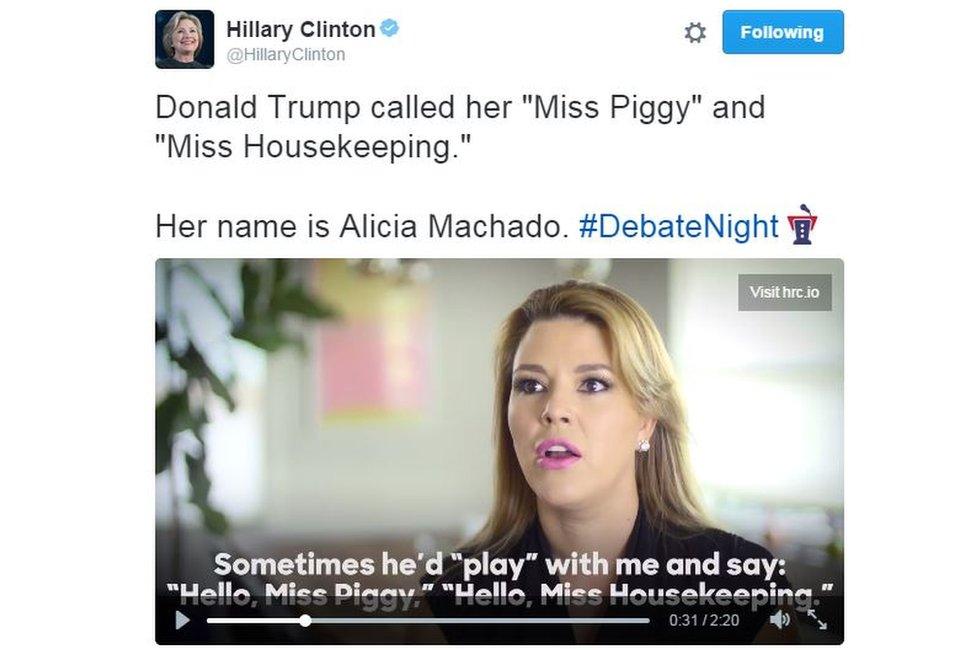Presidential debate: Trump-Clinton showdown breaks TV record
- Published
Key moments from the Clinton-Trump debate
The presidential debate between Hillary Clinton and Donald Trump was watched by 84 million people on US TV, breaking a previous record set 36 years ago.
Jimmy Carter and Ronald Reagan's debate in 1980 drew 80.6 million viewers.
The viewing figures only count those who watched the debate on the 13 US TV channels that carried it live, meaning the true figure may be much higher.
Millions are also thought to have watched worldwide through online live streams or in bars and at parties.
The data provider Nielsen said, external that viewers stayed tuned through the 98-minute debate.
Mr Trump told supporters on Tuesday that he knew the debate would have "one of the largest audiences in the history of television" but he "took a deep breath" and "pretended I was talking to my family".
"You just block it out," he said.
Reality Check: Clinton v Trump debate
Presidential election debate: All our best material in one place
Hillary Clinton and Donald Trump's debate body language
In 2015 the NFL's Super Bowl won the biggest US TV audience to date when 114.4 million people watched New England play Seattle.
There are two more presidential debates to come between the candidates - on 9 October and 19 October - before the election on 8 November.
On 9 October, Mrs Clinton and Mr Trump will have competition for the attention of the US; NFL teams the Green Bay Packers and the New York Giants will be playing at the same time as the second debate.
Who won?
Overnight polls with small samples were split on who won the first televised debate on Monday, but more rigorous surveys are due in the coming days.
On Tuesday, Mrs Clinton said she felt the debate had highlighted important differences between her and Mr Trump.
"His demeanour, his temperament, his behaviour on the stage could be seen by everybody and people can draw their own conclusions," she said.
"And I thought on several occasions he was making charges and claims that were demonstrably untrue - offering opinions that I think a lot of people would find offensive and off-putting.
"He can run his campaign and present himself however he chooses, but the real point is about temperament and fitness and qualification to hold the most important, hardest job in the world and I think people saw last night some very clear differences between us."
Key issues - where candidates stand

Asked how he felt about the debate on the television news programme Fox and Friends on Tuesday, Mr Trump said it had gone well, but complained that the moderator Lester Holt had not pressed Mrs Clinton on her "scandals".
He said he felt tempted to bring up "the many affairs that Bill Clinton had", but held back because the Clintons' daughter Chelsea was in the audience.
"I may hit her harder in certain ways. I really eased up because I didn't want to hurt anybody's feelings," he said.
He added that he might "hit her harder" in the next debate.
People watching on TV give their reaction to the US presidential debate
Asked whether Hillary Clinton had got under his skin, Mr Trump said "at the end maybe, at the very last question".
Mrs Clinton brought up the case of Alicia Machado, a former Miss Universe, saying Mr Trump called her "Miss Piggy" after she gained weight.
But Mr Trump brushed away her accusation said Ms Machado had "gained a massive amount of weight" making it a problem for the Miss Universe pageants, of which he was the owner.
After the debate, Mrs Clinton posted a campaign video, external in which Ms Machado describes how she had been treated by Mr Trump.
Trump and the 'Miss Piggy' row

What do the polls say?
A CNN/ORC poll taken after the debate found that 62% of voters who had watched the head-to-head thought that Mrs Clinton came out on top, with just 27% giving it to Mr Trump.
This is based on interviews with 521 registered voters chosen as part of a random national sample. But only 26% identified themselves as Republicans while 41% identified themselves as Democrats.
An informal CNBC poll on its website found that 61% of people thought that Mr Trump won while 39% went for Mrs Clinton, but as CNBC itself points out, the poll is not scientific - anyone, including people outside the US, appears to be able to vote.
A post-debate survey by Public Policy Polling of 1,002 debate-watchers found that 51% of national voters thought Mrs Clinton had won, with 40% choosing Mr Trump and 9% undecided.